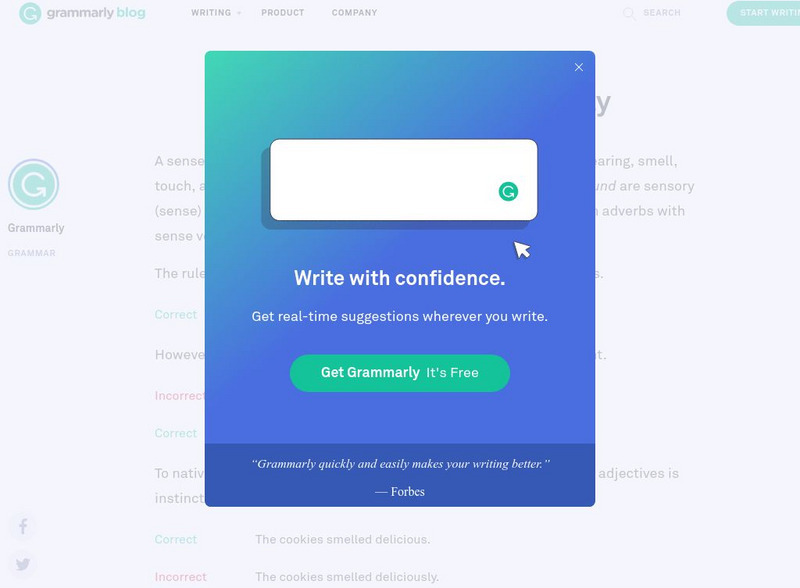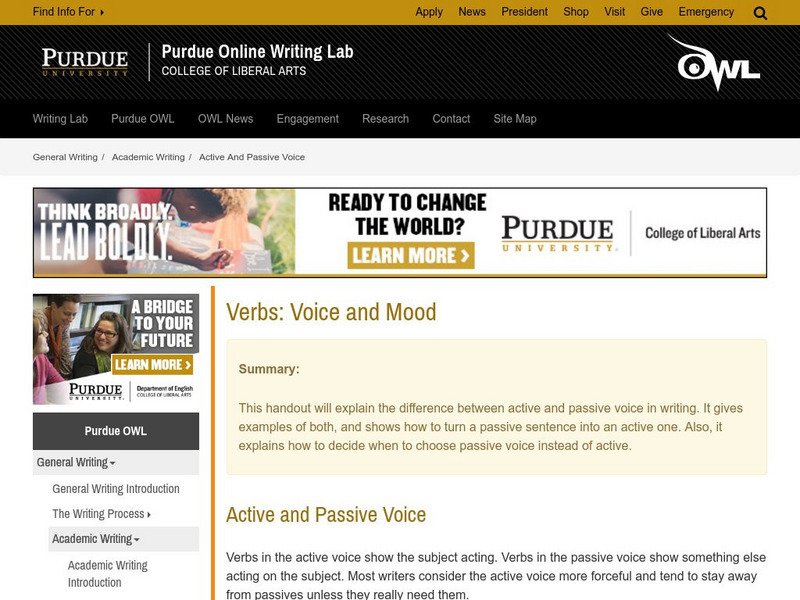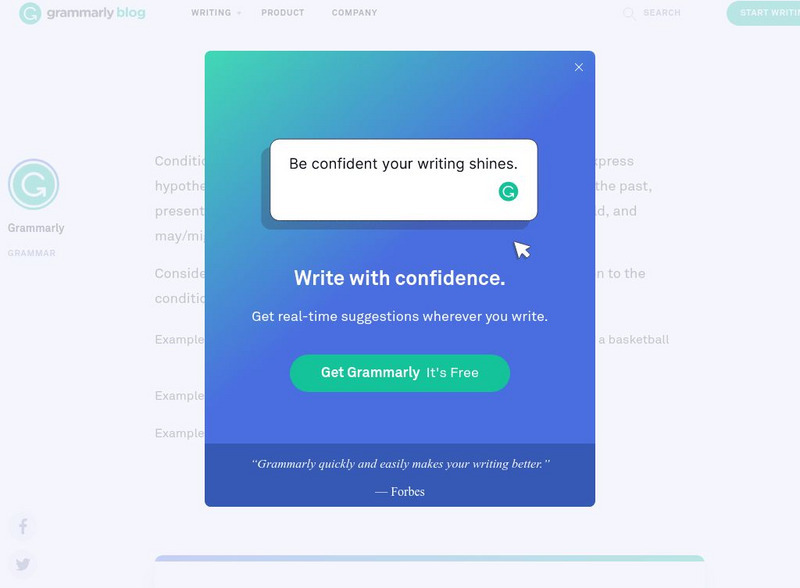Grammarly
Grammarly Blog: Subjunctive Mood
An explanation and examples of writing in subjective mood.
Grammarly
Grammarly Blog: Uses of Verbs
This page focuses on verbs including definitions, action and non-action verbs, verb tenses, and verb moods with examples for all of the above.
Grammarly
Grammarly Blog: Linking Verbs
An explanation and examples of linking verbs and how they are used correctly in sentences.
Grammarly
Grammarly Blog: With Sense Verbs
This page explains the use of adverbs and adjectives with verbs of the five senses and provides examples.
Other
English Grammar 101: Adverbs Modifying Verbs
Learn how adverbs modify verbs in this concise lesson. Practice what you learn with a quiz which gives immediate feedback.
Sophia Learning
Sophia: Auxiliary Verbs
This video lesson focuses on auxiliary verbs including defining the term auxiliary, providing examples, and explaining their three purposes: to create shades of meaning, passive tense, and emphasis.
BBC
Bbc: Skillswise: Verbs
This Skillswise site focuses on verbs. Included are a video about why identifying verbs is important, fact sheets and worksheets for instruction, and quizzes on the information presented. The Skillswise sites from BBC are geared to...
BBC
Bbc: Skillswise: Past, Present, or Future Tense
This Skillswise site focuses on verb tenses. Included are a video about why learning about tenses is important, fact sheets and worksheets for instruction, quizzes on the information presented, and games to practice the skill. The...
Get It Write
Get It Write: The Subjunctive Mood
This article explains the difference between the indicative and subjunctive moods of verbs. Detailed use and examples support the use of subjunctive verbs. There are examples and a self test at the end of the article.
Online Writing Lab at Purdue University
Purdue University Owl: Voice and Mood
A helpful outline of verb structures, including active and passive voice. Imperative, indicative, and subjunctive moods are also included. A printable version is linked.
Grammarly
Grammarly Blog: Conditional Verbs
This Grammarly Handbook resource provides the definition of conditional verbs. Numerous examples of sentences with conditional verbs are provided in this resource.
Towson University
Towson University: Online Writing Support: Verbs
This entry focuses on types of verbs and their functions including action, auxiliary, linking, regular and irregular, transitive and intransitive, and indicative, imperative, and subjunctive mood. It explains and provides examples of each.
Capital Community College Foundation
Guide to Grammar and Writing: Using the Subjunctive
This site from the Capital Community College provides a quiz on the subjunctive verb tense. As the author notes, "the subjunctive form will not be the best choice in all sentences," so be careful.
College Claparede (Switzerland)
English Exercises Online: Gerund?/infinitive?
Fill in the blank with the correct verb form in these 10 fill-in-the-blank exercises.
Other
University of Tennessee: Verbs: Examples of the Subjunctive Mood
A good list of examples of how the subjunctive mood is used. Note: There is a section at the bottom entitled "Where is the Subjunctive?" that gives examples of conversation overheard where the subjunctive mood was not used (and it should...
University of Victoria (Canada)
Study Zone: Simple Past: Regular Verbs 1
In this 10-question exercise, students select the past tense of regular verbs. View questions individually or all at once.
University of Victoria (Canada)
Study Zone: Expressing the Future 1
This 10-question quiz has students select the correct future tense verb forms to fit in the sentences given.
University of Victoria (Canada)
Study Zone: Present Perfect: Forms 1
Students choose the correct present perfect verb for each of the sentences given.
University of Victoria (Canada)
Study Zone: Simple Present Tense 1
In this present tense exercise, students select the words that best complete the sentences.
PBS
Pbs Learning Media: Shifts in Verb Tenses
Shifts in verb tense are useful in helping readers understand actions occurring at different times. Verb tenses should stay consistent in every sentence. [0:42]
PBS
Pbs Learning Media: Using the Correct Verb Tense
Verb tense is used to show when an action occurs, whether it is in the past, the present, or the future. [0:56]
PBS
Pbs Learning Media: Active and Passive Voice
Know when to use verbs in the active voice or the passive voice. The active voice shows the subject acting. The passive voice shows something else acting on the subject. Most writers consider the active voice more colorful and avoid the...
Khan Academy
Khan Academy: Intro to Verb Tense
Choose the appropriate verb tense by asking yourself: 'Does this sentence take place in the past, the present, or the future?'
Texas Education Agency
Texas Gateway: Teaching Active and Passive Verbs in Context
Thse instructional practices use model or mentor sentences to help students learn how authors use conventions to clarify and convey meaning in their writing. These instructional practices are described in detail in Handout 14: Teaching...


















